African hairstyles are not merely about fashion; they are a celebration of culture, tradition, and identity. From intricate braids to vibrant colors, these hairstyles reflect the rich diversity and heritage of the African continent. In this article, we explore seven distinctive African hairstyles that have captivated the world with their beauty and significance.
Fulani Braids: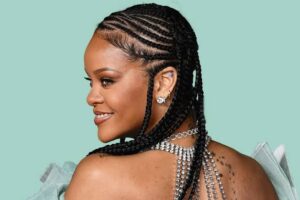
Originating from the Fulani people of West Africa, Fulani braids are characterized by their intricate patterns and geometric designs. These braids often feature thin, delicate plaits adorned with beads or cowrie shells, symbolizing wealth, beauty, and cultural pride. Fulani braids are not only visually stunning but also serve as a form of self-expression and communal bonding within the Fulani community.
Bantu Knots: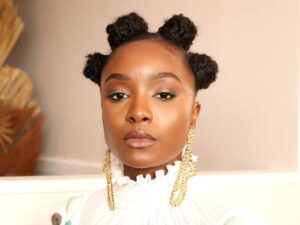
Bantu knots, also known as Zulu knots or Nubian knots, are a traditional African hairstyle with roots in Southern Africa. These small, coiled knots are created by twisting sections of hair and wrapping them tightly against the scalp. Bantu knots are not only fashionable but also practical, providing protection and promoting hair growth. They have gained popularity worldwide for their versatility and distinctive appearance.
Cornrows: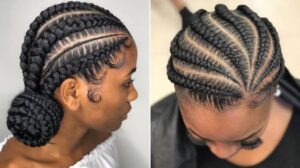
Cornrows are a classic African hairstyle that involves braiding the hair close to the scalp in neat, straight lines. Originating from ancient Africa, cornrows have been worn for centuries as a symbol of cultural identity, social status, and religious beliefs. Today, cornrows are cherished for their versatility and durability, making them a popular choice for both men and women of African descent.
Kente Weaving: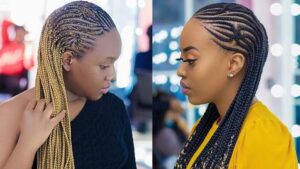
Kente weaving is a traditional Ghanaian art form that involves weaving brightly colored strips of cloth into intricate patterns. These colorful fabrics are then fashioned into head wraps, known as “duku” or “gele,” which are worn as statement pieces for special occasions and cultural ceremonies. Kente weaving is more than just a hairstyle; it is a visual representation of Ghanaian heritage and pride.
Also, read; Nigeria’s Senate Proposes Death Penalty for Drug Trafficking in Tough New Legislation
Afro:
The Afro, short for “Afro-textured hair,” is a natural hairstyle characterized by its voluminous, rounded shape. Popularized during the Black Power movement of the 1960s and 1970s, the Afro became a symbol of Black pride, empowerment, and resistance against racial oppression. Today, the Afro remains a timeless and iconic hairstyle, representing resilience, self-acceptance, and cultural heritage.
Tuareg Veils:
In North Africa, particularly among the Tuareg people of the Sahara Desert, veils play a significant role in traditional attire and grooming practices. Tuareg men and women wear indigo-dyed veils, known as “tagelmust” or “chech,” to protect themselves from the harsh desert environment and to signify their cultural identity. These veils are wrapped around the head and face, leaving only the eyes exposed, creating a striking and mysterious appearance
Suku: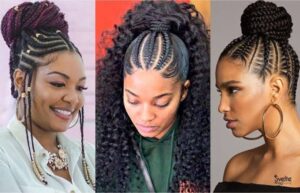
Suku, also known as “Shuku” or “Patewo,” is a popular Yoruba hairstyle from Nigeria characterized by its intricate braided pattern and elevated bun. Suku hairstyles are often adorned with beads, cowrie shells, or other decorative accessories, symbolizing beauty, femininity, and cultural heritage. Suku hairstyles are worn for various occasions, including weddings, festivals, and traditional ceremonies, making them an integral part of Yoruba culture.
Conclusion:
African hairstyles are more than just a fashion statement; they are a reflection of identity, heritage, and pride. From the elaborate braids of the Fulani people to the vibrant colors of Kente weaving, each hairstyle tells a unique story and celebrates the rich diversity of the African continent. By embracing these hairstyles, individuals honor their cultural roots and contribute to the preservation of African heritage for future generations.

